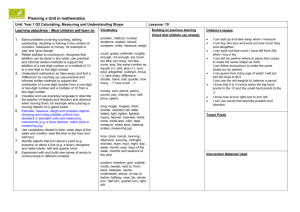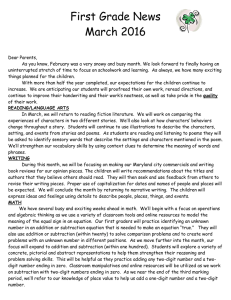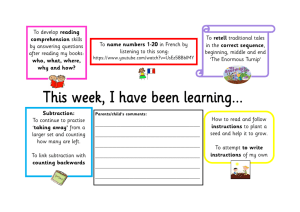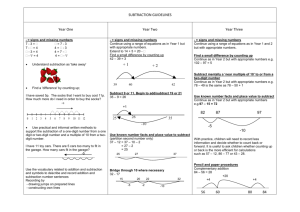Mathsworks Yearly Plans Year 1 Block D (DOC, 45 KB)
advertisement
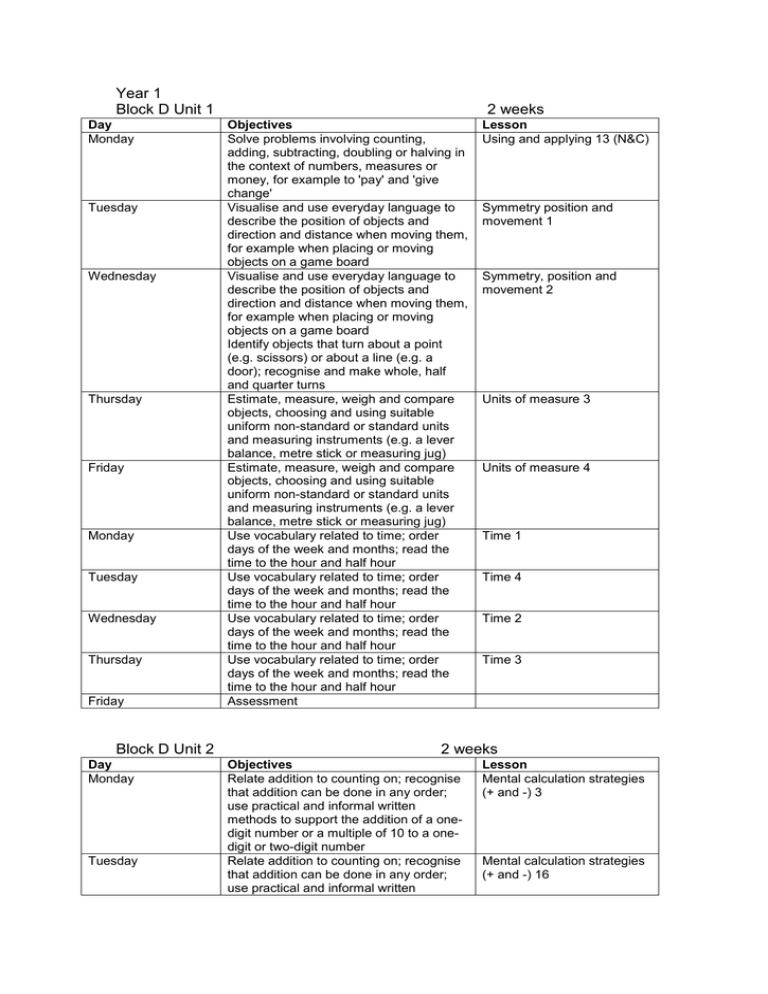
Year 1 Block D Unit 1 Day Monday Tuesday Wednesday Thursday Friday Monday Tuesday Wednesday Thursday Friday Block D Unit 2 Day Monday Tuesday 2 weeks Objectives Solve problems involving counting, adding, subtracting, doubling or halving in the context of numbers, measures or money, for example to 'pay' and 'give change' Visualise and use everyday language to describe the position of objects and direction and distance when moving them, for example when placing or moving objects on a game board Visualise and use everyday language to describe the position of objects and direction and distance when moving them, for example when placing or moving objects on a game board Identify objects that turn about a point (e.g. scissors) or about a line (e.g. a door); recognise and make whole, half and quarter turns Estimate, measure, weigh and compare objects, choosing and using suitable uniform non-standard or standard units and measuring instruments (e.g. a lever balance, metre stick or measuring jug) Estimate, measure, weigh and compare objects, choosing and using suitable uniform non-standard or standard units and measuring instruments (e.g. a lever balance, metre stick or measuring jug) Use vocabulary related to time; order days of the week and months; read the time to the hour and half hour Use vocabulary related to time; order days of the week and months; read the time to the hour and half hour Use vocabulary related to time; order days of the week and months; read the time to the hour and half hour Use vocabulary related to time; order days of the week and months; read the time to the hour and half hour Assessment Lesson Using and applying 13 (N&C) Symmetry position and movement 1 Symmetry, position and movement 2 Units of measure 3 Units of measure 4 Time 1 Time 4 Time 2 Time 3 2 weeks Objectives Relate addition to counting on; recognise that addition can be done in any order; use practical and informal written methods to support the addition of a onedigit number or a multiple of 10 to a onedigit or two-digit number Relate addition to counting on; recognise that addition can be done in any order; use practical and informal written Lesson Mental calculation strategies (+ and -) 3 Mental calculation strategies (+ and -) 16 Wednesday Thursday Friday Monday Tuesday Wednesday Thursday Friday methods to support the addition of a onedigit number or a multiple of 10 to a onedigit or two-digit number Relate addition to counting on; recognise that addition can be done in any order; use practical and informal written methods to support the addition of a onedigit number or a multiple of 10 to a onedigit or two-digit number Solve problems involving counting, adding, subtracting, doubling or halving in the context of numbers, measures or money, for example to 'pay' and 'give change' Understand subtraction as 'take away' and find a 'difference' by counting up; use practical and informal written methods to support the subtraction of a one-digit number from a one-digit or two-digit number and a multiple of 10 from a twodigit number Understand subtraction as 'take away' and find a 'difference' by counting up; use practical and informal written methods to support the subtraction of a one-digit number from a one-digit or two-digit number and a multiple of 10 from a twodigit number Understand subtraction as 'take away' and find a 'difference' by counting up; use practical and informal written methods to support the subtraction of a one-digit number from a one-digit or two-digit number and a multiple of 10 from a twodigit number Estimate, measure, weigh and compare objects, choosing and using suitable uniform non-standard or standard units and measuring instruments (e.g. a lever balance, metre stick or measuring jug) Use vocabulary related to time; order days of the week and months; read the time to the hour and half hour Use vocabulary related to time; order days of the week and months; read the time to the hour and half hour Solve problems involving counting, adding, subtracting, doubling or halving in the context of numbers, measures or money, for example to 'pay' and 'give change' Assessment Block D Unit 3 Day Monday Understanding addition and subtraction 16 Understanding addition and subtraction 8 Understanding addition and subtraction 11 Mental calculation strategies (+ and -) 7 Units of measure 16 Time 5 Using and applying 10 (SSM&HD) 2 weeks Objectives Relate addition to counting on; recognise that addition can be done in any order; use practical and informal written Lesson Mental calculation strategies (+ and -) 13 Tuesday Wednesday Thursday Friday Monday Tuesday Wednesday Thursday Friday methods to support the addition of a onedigit number or a multiple of 10 to a onedigit or two-digit number Relate addition to counting on; recognise that addition can be done in any order; use practical and informal written methods to support the addition of a onedigit number or a multiple of 10 to a onedigit or two-digit number Understand subtraction as 'take away' and find a 'difference' by counting up; use practical and informal written methods to support the subtraction of a one-digit number from a one-digit or two-digit number and a multiple of 10 from a twodigit number Understand subtraction as 'take away' and find a 'difference' by counting up; use practical and informal written methods to support the subtraction of a one-digit number from a one-digit or two-digit number and a multiple of 10 from a twodigit number Visualise and use everyday language to describe the position of objects and direction and distance when moving them, for example when placing or moving objects on a game board Identify objects that turn about a point (e.g. scissors) or about a line (e.g. a door); recognise and make whole, half and quarter turns Estimate, measure, weigh and compare objects, choosing and using suitable uniform non-standard or standard units and measuring instruments (e.g. a lever balance, metre stick or measuring jug) Use vocabulary related to time; order days of the week and months; read the time to the hour and half hour Use vocabulary related to time; order days of the week and months; read the time to the hour and half hour Solve problems involving counting, adding, subtracting, doubling or halving in the context of numbers, measures or money, for example to 'pay' and 'give change' Assessment Mental calculation strategies (+ and -) 19 Mental calculation strategies (+ and -) 10 Mental calculation strategies (+ and -) 14 Using and applying 4 (SSM&HD) Symmetry, position and movement 3 Units of measure 20 Time 6 Using and applying 9 (SSM&HD)
